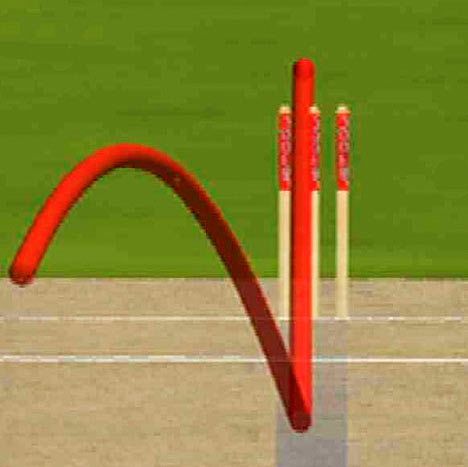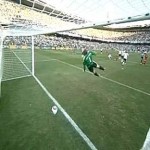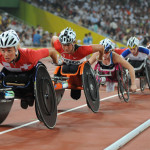Much of this blog was written during the week of the “anniversary games” at the Olympic Stadium in Stratford, during which many waxed lyrical about how the Olympics were a national high point and encouraged millions to participate in sport, often for the first time, while others considered in the best tradition of Scrooge that at a time of national austerity it was not good value for money, whatever government might say.
The reason for the delay in publishing it is that I felt conflicted, or at least ambivalent about several of these issues. It would be great to agree with the event organisers, but I’m struggling to find any sympathy for them, or the way the post-Olympic era has been handled. Cliché of the year has to be “legacy” – and I always felt that none of the effort to host the Olympics would be worthwhile unless people take up the spirit and enjoy sport at all levels, participating and spectating, to a far greater degree.
Where I take issue is that in practice this is not a democratisation of sport but so many decisions taken from on high by bodies, some appointed by government and others from within the discipline. I hate that they select athletes for competition for conforming to their rules rather than being the best; Mavericks who happen to be the best are discarded in favour of those with less talent who play by the rules. In the same way, people are selected on the back of past triumphs rather than current form; sentimentality lives.
No, sport is not what it was when I was young, which is neither to say it is altogether better nor worse. In many ways it has grown up and ceased to be the naive and innocent pleasure of yore. It is synonymous with big business, designed to cash in on the desire of people to see in person or live on TV, but still follows many practices alien to the world of business. Indeed, some of the traditions clung on to are among the very worst aspects. Sport in general has become huge business, but while it has embraced and enshrined money it has struggled to reach an enlightened state of governance, at least in many sports. Trouble is, few are exempt, and the Olympics was certainly not the unalloyed triumph the government and others paint it to be.
What follows is my commentary on some examples of issues affecting most sports in the modern era. Here are a few more in case you feel in the mood!
Fans: dumped upon from a great height
Many would disagree, but in many ways the lot of the fan seems to have gone backwards in the last 50 years, at least in part due to regulation. We now have all-seater stadia, which to the stadium owners offers a greater degree of comfort and safety, yet many fans would prefer to stand. Leaving that aside, we don’t actually have any more or better entertainment than we ever had – other than the occasional action replay and a higher standard of scoreboard than in the old days.
Maybe new stadia are marginally more comfortable, have better loos, are more accessible and cheaper to operate, but then so they should be given the vast cost of admission at all but a very few sports. For many fans the top levels are simply no longer viable, and I include in that many sports, not just Premier League football, Test matches, Olympic tickets, Wimbledon and the ilk. Everyday tickets to see very mediocre events at ordinary clubs have become prohibitively expensive to people on the average wage, the working man, the bloke who at one time would have been the core audience for football matches on a Saturday afternoon.
Catering at sports venues is also subject to criminal charging without being so much as one notch better than it used to be (not been to Norwich so I can’t comment on the impact of Delia’s intervention in the catering outlets.)
My estimation is that sport is cashing in, often at its own cost. It’s not the same sense of joy attending as a fan these days. Following your team is no longer being part of the same community, though fans with season tickets may well disagree.
Money 1: All that glisters…
As mentioned above, at one time sport was the low-cost working man’s entertainment, bar none. Football, athletics, rugby league, speedway and other sports, whatever your sport it was there to be enjoyed at an affordable level.
Many will tell you money, particularly TV money, ruined the sport. Much of it went direct to the players and made agents very rich indeed, but nothing was held back for the development of sports at the grass roots. You may recall that Alan Sugar, in his time as Chairman at Spurs, was shouted down for daring to suggest money be reserved and channelled down the line. How ironic, given that top footballers now “earn” pushing £300k per week, a figure mirrored in many sports. According to the PFA average earnings are now as follows:
Average salaries
Source: PFA
- Premier League: £25,000 to £30,000 a week. Top earners: £250,000
- Championship: £4,000 to £5,000 a week. Top earners £8,000 to £9,000
- League One: £1,700 to £2,500 a week
- League Two: £1,300 to £1,500 a week
I’m not a big fan of the LTA, nor do I think they have succeeded in getting tennis played at grass roots level by children of working class families, but at least they have invested in some facilities and coaching staff at that level, where the FA seems to begrudge football any resources at the local level.
But the disparity between rich and poor in most sports seems to be increasing, if anything, as the big earners decide they can pick and choose where they play in order to cherry pick top prizes and appearance money. To my mind no player in any sport should be above to earn more than 10 times the mean, and that is generous.
Money 2: Gambling temptations
Match fixing seems to be a constant temptation to participants at all level. Gambling syndicates, notably in the Far East, where such things are not regulated or monitored, seem to find it cheap to bribe players, and when the odds are not simply stacked on the outcome of the match but any particular event at any moment then the possibilities are limitless.
Unless there are eye witnesses or patterns of behaviour causing suspicion, it can be almost impossible to tell whether someone has been nobbled. After all, we all make mistakes, bowlers bowl the occasional no ball, snooker players miss pots and so on. How do we rid our sports of any malign influence to influence outcomes?
Stephen Lee was this week banned for 12 years and fined £40,000 for his alleged involvement in match fixing, but protested his innocence:
“It’s just absolutely outrageous. I am absolutely devastated at what’s happened here. I’m going to be with a QC on Friday morning and we are going to look at the whole picture and start making some big holes. They’ve got no facts.”
Charges against him:
Tribunal chairman Adam Lewis QC could have imposed a lifetime ban, but said the player had been “weak” and others had taken advantage of him. He found that three groups of gamblers had made a total profit of nearly £100,000 from bets placed on Lee, although the player has denied any wrongdoing.
He also said it had not been established that Lee deliberately lost a match he could have won – rather that he “acted improperly in relation to matches that he either believed he would lose, or that he believed he would win sufficiently comfortably that he could drop the first frame”.
A good place to start then would be a complete ban on all sportsmen and women from any involvement in gambling activity direct or via any intermediary. Has this been implemented in any sport, in spite of repeated accusations and investigations? Not that I’m aware of.
Not like corruption is anything new though. The Black Sox scandal of 1919 lives long in American memories, but have we really learned anything in the meantime? Say it ain’t so, Joe.
Drugs cheating
In the light of cheats in athletics (such as Ben Johnson and many more), cycling (see the Lance Armstrong you might feel justified in thinking any sporting achievement is open to question, all the more since there is a lobby that thinks we should allow sporting performers to take anything they like.
But the anti-doping authorities have finally, finally got their act together and have taken the double blind testing to the degree that you can get banned as a drug cheat for taking medicines over the counter which happen to contain ingredients banned as “performance enhancing” – even cold remedies. This seems to me a trifle extreme, but at least the testing regime catches a lot more drug cheats than ever before. Do think there should be some means of telling the difference between genuine and abusive drug use.
Whether that represents the majority or the tip of the iceberg I have no way of knowing, but I do know this: however advanced the testers get, the real cheats will be one step ahead in finding ways to mask the effects of their drugs. Armstrong has admitted to going through blood transfusions in the team coach before being tested, yet it is not even clear whether the testing regime has ways to detect or prevent such abuses.
In fact, look closer and you’ll see the rules are still in disarray – there is no clarity of policy whatsoever. Consider these questions:
- Are all sports tested to the same degree? Not at all. Nor do I have any idea whether they all apply the same tests for the same substances.
- How long do you get banned, depending on the severity of the offence? That seems to vary from sport to sport and country to country. It might be 2 years or it might be a lifetime.
- Are you allowed to compete once you have served your sentence? Views seem polarised between those who think once a cheat, always a cheat, and those who believe in rehabilitation and giving people a second chance.
- I can’t tell you whether there has been any amnesty offered for people owning up to drugs, but the current welter of hardline publicity does not encourage people to admit their habit, make confessions and supply information to help the authorities find more athletes and clinicians aiding and abetting the illegal trade in performance-enhancing drugs.
I’m damned sure that innocent people are getting banned while cynical cheats are lauded for their achievements. It might be best endeavours on the part of USADA and all other anti-doping agencies, but to many it feels too little, too late.
The Paralympic effect
It’s not that many years since most people looked upon people with disabilities with a mixture of ghoulish curiosity, condescension, fear and loathing. The rise of the Paralympics corrected many misapprehensions, but notably these two: that being disabled did not stop you achieving great things, or leading a happy and fulfilled life.
A remarkable step forward, though whether the same lessons have entered our culture is less certain. Are disabled people in general treated with any less fear or prejudice? Are they given greater chances in life than ever before?
If you take the context as government doing medicals on people with disabilities via ATOS in order to declare them fit for work and thereby not claim disability allowances, it would appear that they are regarded as lowest of the low, not equals. Forget the glitz and the glamour of the Paralympics, to be disabled in any way within the UK places you at a massive disadvantage, and things are no better now than they ever were.
Governance
Ever since Will Carling famously referred to board members at the RFU as being “old farts”, amateurism among regulators of each sport has been a contentious issue, or rather the lure of the easy dollar at the expense of all else. Take your pick: FIFA, UEFA and the FA in football have between them made any number of dumb decisions impacting the game, the clubs, the players and especially the fans.
Choosing Qatar for the 2022 World Cup was a prime case in point. It was always going to be too hot in summer but none of FIFAs committee apparently twigged that – it was the cash they went for. Conducting the competition when the temperatures are moderately cooler means interfering in the domestic season of all Europeans leagues. Not only that, but choosing a small country with no existing football infrastructure or leagues means a massive dependency on the building of a new city, a range of new stadia and a “fan village”, which any fan would tell you is asking for trouble.
This is without considering the homophobic laws of Qatar (a dry state, since you ask) and therefore the real danger than fans, players and/or officials participating in the event could find themselves behind bars for transgressing the medieval laws of this state.
I could easily have chosen any sport in that analysis. Wherever you look, the governance of sports inspires little or no confidence in the committees that make the decisions. They simply cannot be trusted, and the reason they can’t be trusted is simple: they have sold out to business interests and have forgotten totally the grass roots, especially the loyal supporters who keep the sport afloat.
A solution: ensure that representatives of fans and players are elected on to every sporting committee as voting members and report back their version of events.
Technology
Technology is such a wonderful thing. It can tell in a split second what a true refereeing or umpiring decision should be, and therefore prevent errors of judgement by officials who have the same nanoseconds and no instant replays to come to their decisions. They get it wrong, time and again. Their decisions change results, and when there are multimillions riding on the best team winning criminal injustices cannot be allowed to occur.
Football is dipping one little toe in the water through the planned introduction of goal line technology, so goals will be awarded when the ball crosses the line in spite of match officials who blindly ignore the fact, but many more sports have now introduced technology in some form, often through the Hawkeye system: cricket, tennis and more.
From my perspective, the very best of technology should be applied automatically so EVERY decision is correct, but that is not how it has been done. Instead, many sports apply a referral system so the players are entitled to a certain number of “Challenges” to the decision of an umpire or referee or whatever match official makes the decisions. This has resulted in many more injustices, not to mention making controversy where it doesn’t need to exist.
Cricket made a hash of the DRS system, which was in my opinion totally avoidable. We don’t need reviews, we need correct decisions every time, with the 4th umpire telling the umpires on the pitch if a decision is wrong. End of story.
***
Doubtless there are many more scandals we can discuss, but that’s your starter for ten. Discuss!










